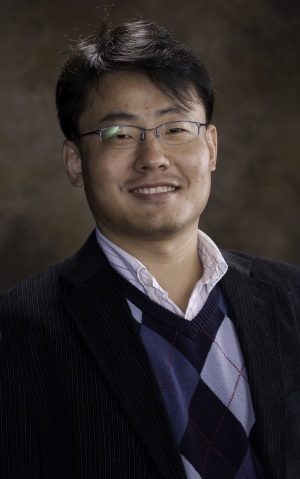Apr 22 2009
Engineering researchers at the University of Arkansas have fabricated and tested a unique biosensor that measures concentrations of potassium and hydrogen ions in the human heart with high specificity. The research could lead to a superior method of monitoring indicators of acute myocardial ischemia, or AMI, one of the leading causes of cardiovascular failure.
 Taeksoo Ji, University of Arkansas
Taeksoo Ji, University of Arkansas
“AMI is triggered by insufficient blood supply to the heart muscles,” said Taeksoo Ji, assistant professor of electrical engineering. “This lack of blood supply results in excess anaerobic metabolism, or lack of oxygen, which we know is accompanied by an increase in potassium and hydrogen ions released from cardiovascular cells. The goal is to develop a robust yet inexpensive sensor that rapidly detects these chemicals that signal the onset of AMI.”
Due in part to the National Heart Lung and Blood Institute’s emphasis on promoting research on rapid detection of the symptoms of acute myocardial ischemia, various types of biosensor designs, including ion-selective optical fibers, wave-guides, nanoparticle fluorescence sensors and ion-selective electrodes, have been used to detect potassium and hydrogen in the blood stream. Working in the Organic Electronics and Devices Laboratory, Ji, research assistant professor Soyoun Jung and student Pratyush Rai developed an ion-sensitive field effect transistor, yet another type of sensor used to detect potassium and hydrogen in blood.
Most ion-sensitive field effect transistors are silicon based. Instead of silicon, Ji’s team worked with a low-cost organic semiconductor known as poly 3-hexylthiophene, which they fabricated on a flexible substrate. The design and fabrication process was based on special devices used to deposit organic semiconductors on substrates. Organic semiconductor films do not require high vacuum and temperature cycles for deposition and curing, which reduces cost of production.
The researchers also developed a smoothing technique to assess the effect of external electric fields on the devices. The human heart creates a great amount of electrical charge from the organ’s network of neurons that help it relay electrical impulse for pace-making activity. The myocardium, or the middle section of the heart wall, has intense electrical activity. Diagnostic tools such as electrocardiograms detect electric fields emanating from the heart. To operate properly, implantable biosensor devices must be immune to these electric fields, or background noise.
The researchers’ smoothing technique and noise calculation demonstrated a high signal-to-noise ratio. Overall, the testing and validation process for the device displayed stable calibration characteristics, which proved its independence from surrounding electrical fields. In other words, the sensor was immune to external voltages.
Ji collaborates with Vijay Varadan, distinguished professor of electrical engineering and director of the Center for Wireless Nano-, Bio- and Info-Tech Sensors and Systems, which is supported by the National Science Foundation. Led by Ji, the Organic Electronics and Devices Laboratory is one of the center’s four laboratories.
Varadan holds the College of Engineering’s Twenty-First Century Endowed Chair in Nano- and Bio-Technologies and Medicine and the college’s Chair in Microelectronics and High Density Electronics. In addition to his position as director of the above center, he directs the university’s High Density Electronics Center. Varadan is also a professor of neurosurgery in the College of Medicine at the University of Arkansas for Medical Sciences in Little Rock, Ark.
The researchers’ findings were published in Applied Physics Letters, a journal of the American Institute of Physics Publishing. An electronic copy of the article can be provided upon request.